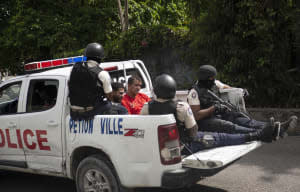17 arrested in slaying of Haitian president, including 2 Haitian Americans
- Oops!Something went wrong.Please try again later.

Seventeen people have been arrested in connection with the assassination of Haitian President Jovenel Moïse, including two men believed to be Haitian Americans, officials said Thursday.
Moïse was shot and killed early Wednesday morning by gunmen who stormed his home near Port-au-Prince. During a Thursday night press conference, Léon Charles, chief of Haiti's National Police, said 15 of the detained suspects are from Colombia. The suspects were in the room with him, handcuffed and sitting on the floor. Charles also said three suspects were killed by police and eight remain at large.
One of suspects has been identified as 35-year-old James Solages, The Associated Press reports. Solages is the founder of a south Florida charity that describes him as a "certified diplomatic agent" who previously worked as a bodyguard for the Canadian Embassy in Port-au-Prince. The embassy did not respond to AP's request for comment.
Witnesses told AP that two of the suspects were captured in Port-au-Prince on Thursday by bystanders who saw them hiding in bushes. The crowd then set fire to two bullet-riddled cars, and Charles asked the public Thursday night to stay calm through the turmoil and not destroy evidence.
Officials blamed the assassination on "a highly trained and heavily armed group." The Haitian newspaper Le Nouvelliste reports that Moïse was shot 12 times and his bedroom ransacked, citing a judge involved in the investigation, Carl Henry Destin. Two workers in the house were tied up, and Moïse's daughter, Jomarlie, hid during the attack in her brother's bedroom.
Haiti is one of the world's poorest countries, and since the assassination, the streets of Port-au-Prince have been largely empty. Residents hiding in their homes say they believe if the president can't be protected, neither can they.
Moïse dissolved parliament in January 2020 and was ruling by decree, and the opposition had been calling on him to step down. Under Haiti's constitution, the head of the Supreme Court would have replaced Moïse, but the chief justice recently died of COVID-19. Interim Prime Minister Claude Joseph assumed leadership after Moïse's death, but he was supposed to be replaced on Wednesday by neurosurgeon Ariel Henry, who was named prime minister by Moïse on Tuesday. During an interview with AP, Henry said the situation is confusing, but he is "the prime minister in office."
You may also like
Britain is going to try to 'live with' COVID. The rest of the world is watching.
Why Facebook may not be celebrating the dismissal of 2 antitrust cases
Fox is launching a weather streaming service, and it's already feuding with The Weather Channel
